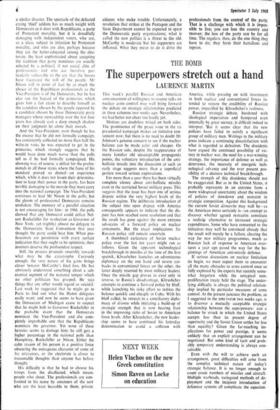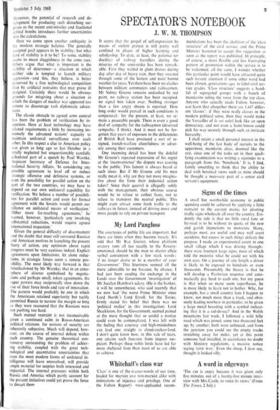The superpowers stretch out a hand
THE BOMB LAURENCE MARTIN
This week's parallel Russian and American announcement of willingness to resume talks on nuclear arms control may well bring forward the debate on strategic relationships predicted in these columns two weeks ago. Nevertheless, we had better not cheer too loudly yet.
Motives are doubtless mixed on both sides. The prominence of the peace issue in the us presidential 'campaign makes an initiative con- venient now; but there is no need to doubt Mr Johnson's genuine concern to see if the nuclear balance can be made safer and cheaper. On the Russian side, despite the reappearance of many familiar old unacceptable propaganda points, the voluntary introduction of the anti- ballistic missile into the discussion at such an early stage suggests more than a superficial gesture toward serious explorations.
For more than a year there has been virtually complete silence about anti-ballistic missiles even in the restricted Soviet military press. This suggests that the issue has been one of serious dispute within the very highest levels of the Russian regime. The deliberate introduction of the subject into open dispute with America consequently appears to indicate that the dis- pute has now reached some resolution and that the result has gone against the more extreme advocates of a forward policy on nuclear armaments. But the exact implications for Russian policy still remain uncertain.
A thumbnail caricature of Soviet nuclear policy over the last ten years might run as follows. Given the apparent technological breakthrough in missiles at the time of the first sputnik, Khrushchev launches an adventurous diplomacy on the one hand and severe cut- backs in conventional forces on the other, the latter deeply resented by most military leaders. Once the missile gap proves to exist only in reverse, to Russia's disadvantage, Khrushchev attempts to continue a forward policy by bluff, while launching his risky effort to redress the balance quickly and cheaply in Cuba. With his bluff called, he retreats to a conciliatory diplo- macy of detente while initiating a build-up of strategic strength that is now bearing fruit in the improving ratio of Soviet to American force levels. After Khrushchev, the new leader- ship seems to have continued his latterday determination to avoid a collision with America, while pressing on with investment in both nuclear and conventional forces in- tended to restore the credibility of Russian power, imperilled by Khrushchev's rashness.
Russian strategic debate, burdened with ideological imperatives and hampered even internally by great secrecy, is difficult indeed to interpret. 'But it seems clear that the new policies have failed to satisfy a significant group of military men. Writings in the military press indicate a continuing dissatisfaction with what is regarded as defeatism. The dissidents have argued the continued possibility of vic- tory in nuclear war, the need for a war-winning strategy, the importance of defence as well as deterrence, the necessity of energetic tech- nological advance and the ever present pos- sibility of a decisive technical breakthrough.
The strength of this dissidence should not be exaggerated. But as in the United States, it probably represents in an extreme form a more widespread uncertainty about the wisdom of policies of slowdown and restraint in strategic competition. Against this background the current Soviet demarche may well be—as the American move certainly is—an attempt to discover whether agreed restraints constitute a realistic alternative to increased strategic expenditures. Some who have consented to the initiatives may well be convinced already that the result will merely be a failure, clearing the way for new military programmes, much as Russian lack of response to American over- tures a year ago paved 'the way for the be- ginnings of American anti-missile defence.
If serious discussions on nuclear limitation do begin, we must expect them to encounter all the many obstacles to arms control once so fully explored by the experts but recently some- what forgotten while the untypical non- proliferation treaty held the stage. The under- lying difficulty is always the political relation- ship implied by particular measures of arms control. At the present juncture the problem, as I suggested in the SPECTATOR two weeks ago, is to discover a mutually acceptable strategic relationship between the superpowers: can a balance be struck in which the United States accepts less than its present degree of superiority and the Soviet Union settles for less than equality? Given the far-reaching im- plications for power and prestige, it seems unlikely that an explicit arrangement can be negotiated. But some kind of tacit and 'prob- ably temporary understanding is always con- ceivable.
Even with the will to achieve such an arrangement, great difficulties will arise from the complex technical nature of today's strategic balance. It is no longer enough to count crude numbers of missiles and aircraft. Multiple warheads, variegated methods of de- ployment and the incipient introduction of defensive systems all complicate the equation. Ntoreover, the potential of research and de- velopment for producing such disturbing sur- prises as the recent anti-missiles and fractional orbital bombs introduces further uncertainties into the calculations.
Here we come upon another ambiguity in the modern strategic balance. The generally accepted goal appears to be stability; but what kind of stability is it to be? To some, stability .eems to mean sluggishness in the arms race.
Others argue that what is important is the stability of deterrence—a situation in which neither side is tempted to launch military
aggression—and this, they believe, is better
preserved by a free technological competition than by artificial restraints that may prove ill designed. Certainly there would be obvious grounds for misgiving about a situation in which the dangers of nuclear war appeared too remote to discourage rash diplomatic adven- tures.
The classic obstacle to agreed arms control has been the problem of verification by in- spection. Here at least technology may have relaxed requirements a little by increasing im- mensely the advanced nations' capacity to
maintain unilateral surveillance over each
other. In this respect a clue to American policy was given as long ago as last October in a totally neglected but unquestionably carefully calculated part of a speech by Paul Warnke, Assistant Secretary of Defence for Inter- national Security Affairs. 'In considering any possible agreement to level off or reduce strategic offensive and defensive systems, or even the possibility for parallel action on the part of the two countries, we may have to depend on our own unilateral capability for verification. We believe a number of possibili- ties for parallel action and even for formal .igreement with the Soviets would permit our reliance on unilateral means of verification.' Other more far-reaching agreements,' he warned, however, 'particularly any involving -ubstantial reductions, would require agreed international inspection.'
Given the general difficulty of disarmament and the doubt that must still surround Russian and American motives in launching the present flurry of action, any optimism about rapid progress must be very cautious indeed. Explicit agreements upon limitations, let alone reduc- tions, in strategic forces seem a remote pos- sibility. The most likely way forward is that
foreshadowed by Mr Warnke; that in an atmo- sphere of détente symbolised by negotia- tions and perhaps small, token agreements, the super powers may reciprocally slow down the rise of their force levels and rate of innovation. The pattern would probably be one in which the Americans retained superiority but tacitly permitted Russia to narrow the margin so long as they were reassured that the Russians were not pushing too hard.
Such mutual restraint is not inconceivable given a continued calm in Russo-American political relations for notions of security are inherently subjective. Much will depend, how- ever, on the course of internal debate within each country. The genuine theoretical con- troversy surrounding the problem of achiev- ing stability. coupled with the great tech- nological and quantitative uncertainties that even the most modern forms of unilateral in- telligence will leave unresolved, will provide ample material for sceptics both interested and impartial. The internal pressures within both. Russia and America which partly account for the present initiatives could yet prove the force to thwart them











































 Previous page
Previous page